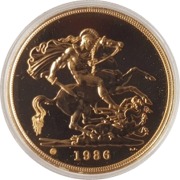 The 1986 Brilliant Uncirculated Gold Five Pounds Piece £5 depicts Benedetto Pistrucci’s famous portrayal of St. George slaying the dragon on the reverse of the coin. A small circled ‘U’ to the left of the date means the coin is of BU quality.
The 1986 Brilliant Uncirculated Gold Five Pounds Piece £5 depicts Benedetto Pistrucci’s famous portrayal of St. George slaying the dragon on the reverse of the coin. A small circled ‘U’ to the left of the date means the coin is of BU quality.
Queen Elizabeth II’s third portrait can be seen on the obverse of the coin, designed by Raphael Maklouf.
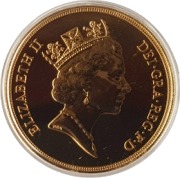 The coin is made of solid 22 carat gold (Gold fineness of 0.916), and is housed in its original Royal Mint acrylic screw top capsule. The coin is presented in its Royal Mint case, accompanied with an individually numbered certificate of authenticity.
The coin is made of solid 22 carat gold (Gold fineness of 0.916), and is housed in its original Royal Mint acrylic screw top capsule. The coin is presented in its Royal Mint case, accompanied with an individually numbered certificate of authenticity.
The 1986 brilliant uncirculated gold five pounds piece has a weight of 39.94 grams, with a diameter of 36.02mm.
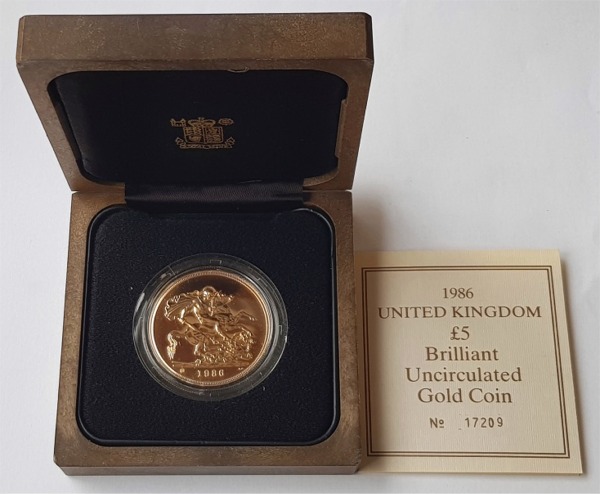
Only 7,723 BU gold five pounds pieces were issued by the Royal Mint in 1986.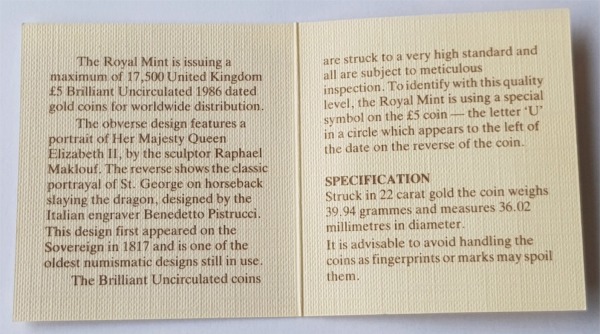
Mintage: 7,723 (may include coins in sets)
Minted at The Royal Mint
Below are some coins currently being offered on eBay. As an eBay Partner, We may be compensated if you make a purchase.
 | 1986 5 Pound/Sovereign 40 Gram 22K Gold Coin NGC MS69 1.177 Oz AGW GEM BU £ 3,363.39 |
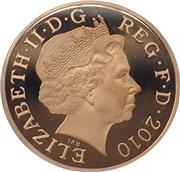 Queen Elizabeth II was the longest reigning British Monarch ever, reigning for over 70 years. Born on 21 April 1926 to King George VI and Elizabeth Bowes-Lyon, she became Queen in 1952 and her Coronation was on 2 June 1953. She died on 8 September 2022. Some coins were released dated 2023.
Queen Elizabeth II was the longest reigning British Monarch ever, reigning for over 70 years. Born on 21 April 1926 to King George VI and Elizabeth Bowes-Lyon, she became Queen in 1952 and her Coronation was on 2 June 1953. She died on 8 September 2022. Some coins were released dated 2023.Queen Elizabeth II issued many coins and was monarch during decimalisation. She married Prince Philip, Duke of Edinburgh in 1947 and had four children. Her eldest son succeeded the throne as King Charles III. House of Windsor.
The Gold £5 Coin
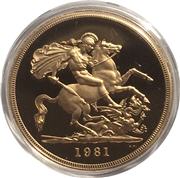
Often referred to as the non commemorative £5 coin or the Quintuple Sovereign as it is exactly five times heaver than a Sovereign (7.9881 x 5 = 39.94g). As one sovereign is nominally one pound then a quintuple sovereign must be five pounds.
The Gold £5 coin has its history deriving from the five guinea coin right back at the start of the 19th Century. In those days a guinea was valued at one pound rather than the one-pound-and-one-shilling it is often remembered as nowadays. George III, George IV and Victoria all issued actual gold £5 coins and others issued a few too, but Elizabeth II began the surge in production, especially from 1980 onwards. From 1990, the £5 coin was minted in Cupro-Nickel too and silver versions were also available.
The Gold Crown
The Crown is another English coin with a long history. You may remember the Half-Crown from pre-decimalisation days, but the Crown has been a commemorative coin for as long as we can remember. The Crown was legal tender at a quarter-pound, which was five shillings (25 pence in decimalised money).
In the Eighties we saw the introduction of the pound coin and the two-pound coin, so the Government decided that the crown needed to be restored to it former glory as biggest denomination coin and the crown was re-denominated to £5 in 1990.
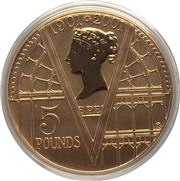
This re-denominated was OK by itself, but as a (still) mainly commemorative coin it was soon available not only as Cupro-Nickel but as silver and ... gold. That meant we had a new, official, gold £5 coin.
It also weighs 39.94g. And to prove its value it has '5 pounds' written on it.
The only difference between the sovereign gold £5 coin and the gold crown is the diameter. The crown maintained its original diameter of 38.61mm compared to the slightly smaller 36.613mm of the sovereign type.
The re-denominated had other effects too. Whether re-denominated is determined as from this point onwards or backward-compatible is unclear to many. The original crown was a gold coin, so does that mean that Henry VIII's gold crowns were the first £5 coins? So the history of coins starts to rewrite itself in some ways, although if this is intended or correct I'm not sure.
The Gold Five-Pound Piece
I've noticed many dealers referring to these coins as '£5 pieces'. Maybe it's a way of avoiding the confusion and grouping the coins into the same category rather than having them as two separate entities. Besides the slight difference in diameter (which is difficult to see as most of these coins are encapsulated in some way) there's little to tell.
If the reverse looks like it commemorated something then it's probably a crown. If the reverse is the same as the reverse of a sovereign of the same year then it could be a five pound coin. Whatever, you have a gold five pounds with almost 40g of gold; it's impressive and they are a great investment.
Five pound coins are often in 4- or 5-coin sets, together with combinations of a sovereign, half-sovereign, double sovereign, quadruple sovereign and maybe some commemorative item or a year-set collectable. They can be bullion, proof or matt-proof.
Despite the high intrinisic value and even higher collector value, five pound pieces are much sought after and are often sold out within days of release causing some of the coins to have a very high price tag.
Formed in the reign of Alfred the Great about the year 886, during the period 1279-1812 it was generally referred to as The Tower Mint as it was housed at the Tower of London. The Master of The Royal Mint has included famous figures such as Sir Isaac Newton.
Since 2010 it has operated as Royal Mint Ltd, a company owned by HM Treasury, under an exclusive contract to supply all coinage for the UK although it also produces medals and coins for other countries. It is currently located at Llantrisant, Wales.
The orignal coinage was Pounds, Shillings and Pence but since decimalisation on 15 February 1971, it is £1 = 100p, that is One Pound = 100 pence. The coinage of the UK is also a long history, the Royal Mint being established as long ago as 886AD when coins were hammered. Today there is perhaps 30 billion coins in circulation, and many (numismatic) collectors coins and sets are issued frequently in gold, silver and other metals.
As an eBay Partner, We may be compensated if you make a purchase.
